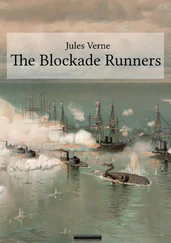“We’re right among the breakers!” said Kennedy.
“Keep cool, Dick. We shan’t touch them,” was the doctor’s quiet answer.
“It’s a jolly way to travel, anyhow!” said Joe, with his usual flow of spirits.
In fact, the doctor managed his balloon with wondrous dexterity.
“Now, if we had been compelled to go afoot over that drenched soil,” said he, “we should still be dragging along in a pestilential mire. Since our departure from Zanzibar, half our beasts of burden would have died with fatigue. We should be looking like ghosts ourselves, and despair would be seizing on our hearts. We should be in continual squabbles with our guides and porters, and completely exposed to their unbridled brutality. During the daytime, a damp, penetrating, unendurable humidity! At night, a cold frequently intolerable, and the stings of a kind of fly whose bite pierces the thickest cloth, and drives the victim crazy! All this, too, without saying any thing about wild beasts and ferocious native tribes!”
“I move that we don’t try it!” said Joe, in his droll way.
“I exaggerate nothing,” continued Ferguson, “for, upon reading the narratives of such travellers as have had the hardihood to venture into these regions, your eyes would fill with tears.”
About eleven o’clock they were passing over the basin of Imenge, and the tribes scattered over the adjacent hills were impotently menacing the Victoria with their weapons. Finally, she sped along as far as the last undulations of the country which precede Rubeho. These form the last and loftiest chain of the mountains of Usagara.
The aeronauts took careful and complete note of the orographic conformation of the country. The three ramifications mentioned, of which the Duthumi forms the first link, are separated by immense longitudinal plains. These elevated summits consist of rounded cones, between which the soil is bestrewn with erratic blocks of stone and gravelly bowlders. The most abrupt declivity of these mountains confronts the Zanzibar coast, but the western slopes are merely inclined planes. The depressions in the soil are covered with a black, rich loam, on which there is a vigorous vegetation. Various watercourses filter through, toward the east, and work their way onward to flow into the Kingani, in the midst of gigantic clumps of sycamore, tamarind, calabash, and palmyra trees.
“Attention!” said Dr. Ferguson. “We are approaching Rubeho, the name of which signifies, in the language of the country, the ‘Passage of the Winds,’ and we would do well to double its jagged pinnacles at a certain height. If my chart be exact, we are going to ascend to an elevation of five thousand feet.”
“Shall we often have occasion to reach those far upper belts of the atmosphere?”
“Very seldom: the height of the African mountains appears to be quite moderate compared with that of the European and Asiatic ranges; but, in any case, our good Victoria will find no difficulty in passing over them.”
In a very little while, the gas expanded under the action of the heat, and the balloon took a very decided ascensional movement. Besides, the dilation of the hydrogen involved no danger, and only three-fourths of the vast capacity of the balloon was filled when the barometer, by a depression of eight inches, announced an elevation of six thousand feet.
“Shall we go this high very long?” asked Joe.
“The atmosphere of the earth has a height of six thousand fathoms,” said the doctor; “and, with a very large balloon, one might go far. That is what Messrs. Brioschi and Gay-Lussac did; but then the blood burst from their mouths and ears. Respirable air was wanting. Some years ago, two fearless Frenchmen, Messrs. Barral and Bixio, also ventured into the very lofty regions; but their balloon burst—”
“And they fell?” asked Kennedy, abruptly.
“Certainly they did; but as learned men should always fall—namely, without hurting themselves.”
“Well, gentlemen,” said Joe, “you may try their fall over again, if you like; but, as for me, who am but a dolt, I prefer keeping at the medium height—neither too far up, nor too low down. It won’t do to be too ambitious.”
At the height of six thousand feet, the density of the atmosphere has already greatly diminished; sound is conveyed with difficulty, and the voice is not so easily heard. The view of objects becomes confused; the gaze no longer takes in any but large, quite ill-distinguishable masses; men and animals on the surface become absolutely invisible; the roads and rivers get to look like threads, and the lakes dwindle to ponds.
The doctor and his friends felt themselves in a very anomalous condition; an atmospheric current of extreme velocity was bearing them away beyond arid mountains, upon whose summits vast fields of snow surprised the gaze; while their convulsed appearance told of Titanic travail in the earliest epoch of the world’s existence.
The sun shone at the zenith, and his rays fell perpendicularly upon those lonely summits. The doctor took an accurate design of these mountains, which form four distinct ridges almost in a straight line, the northernmost being the longest.
The Victoria soon descended the slope opposite to the Rubeho, skirting an acclivity covered with woods, and dotted with trees of very deep-green foliage. Then came crests and ravines, in a sort of desert which preceded the Ugogo country; and lower down were yellow plains, parched and fissured by the intense heat, and, here and there, bestrewn with saline plants and brambly thickets.
Some underbrush, which, farther on, became forests, embellished the horizon. The doctor went nearer to the ground; the anchors were thrown out, and one of them soon caught in the boughs of a huge sycamore.
Joe, slipping nimbly down the tree, carefully attached the anchor, and the doctor left his cylinder at work to a certain degree in order to retain sufficient ascensional force in the balloon to keep it in the air. Meanwhile the wind had suddenly died away.
“Now,” said Ferguson, “take two guns, friend Dick— one for yourself and one for Joe—and both of you try to bring back some nice cuts of antelope-meat; they will make us a good dinner.”
“Off to the hunt!” exclaimed Kennedy, joyously.
He climbed briskly out of the car and descended. Joe had swung himself down from branch to branch, and was waiting for him below, stretching his limbs in the mean time.
“Don’t fly away without us, doctor!” shouted Joe.
“Never fear, my boy!—I am securely lashed. I’ll spend the time getting my notes into shape. A good hunt to you! but be careful. Besides, from my post here, I can observe the face of the country, and, at the least suspicious thing I notice, I’ll fire a signal-shot, and with that you must rally home.”
“Agreed!” said Kennedy; and off they went.
Table of Contents
The Forest of Gum-Trees.—The Blue Antelope.—The Rallying-Signal. —An Unexpected Attack.—The Kanyeme.—A Night in the Open Air.—The Mabunguru.—Jihoue-la-Mkoa.—A Supply of Water.—Arrival at Kazeh.
The country, dry and parched as it was, consisting of a clayey soil that cracked open with the heat, seemed, indeed, a desert: here and there were a few traces of caravans; the bones of men and animals, that had been half-gnawed away, mouldering together in the same dust.
After half an hour’s walking, Dick and Joe plunged into a forest of gum-trees, their eyes alert on all sides, and their fingers on the trigger. There was no foreseeing what they might encounter. Without being a rifleman, Joe could handle firearms with no trifling dexterity.
“A walk does one good, Mr. Kennedy, but this isn’t the easiest ground in the world,” he said, kicking aside some fragments of quartz with which the soil was bestrewn.
Читать дальше












